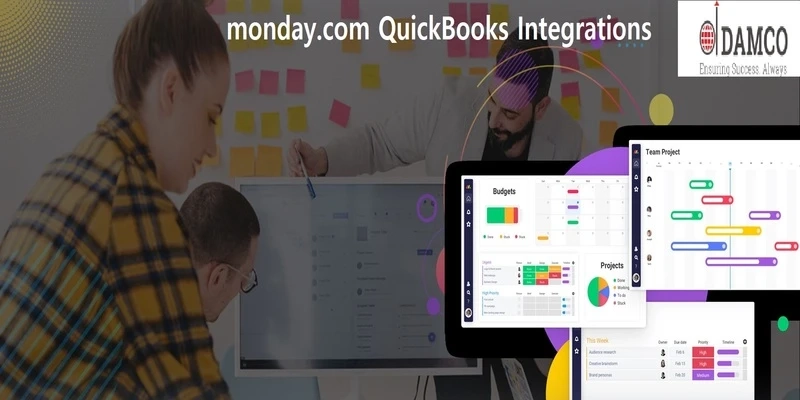
Entrepreneurs or business owners encounter a series of challenges every day, and accounting is a major one. Accounting or bookkeeping is one of the most complicated and crucial functionalities of an enterprise. Monitoring and maintaining financial health can help enterprises become profitable.
Quickbooks is a user-friendly accounting software predominantly used by several organizations to organize multiple aspects of finance & accounting. Integrating QuickBooks with monday.com expedites the efficiency of business accounting. It is obvious that monday.com is a popular work management solution that helps business users handle and delegate multiple workflows such as team management, customer support, social media management, lead management, and others. It gathers and manages all the data related to a customer from the lead procurement phase to the time when they are changed into regulars.
Various functionalities are involved when a lead agrees to acquire a service or product. monday.com QuickBooks integration helps business owners organize and understand multiple financial aspects more easily.
An Overview of monday.com
As stated before, monday.com is a Cloud-based work management platform that provides intuitive tools and features for improving team collaboration and communication. To align workflows with business objectives, monday.com enables teams the ability to interact, distribute tasks, and achieve smooth project completion. Another key reason behind its popularity is that enterprises can gain better customization features than traditional PM tools.
Why QuickBooks Integration with monday.com is Essential
Over the years, accountants or financial experts in organizations use Spreadsheets to trace and organize their business’ project budgets, transactions, and returns. This way of accounting does not help enterprises with long-term forecasting and making crucial budgeting decisions.
Therefore, accounting teams or users can integrate monday.com with QuickBooks to create and manage financial reports and invoices through a few simple clicks, thereby reducing the manual paperwork. Also, this integration helps enterprises keep their customer data highly accessible for the entire finance team since it acts as a single source of truth for billing and payment processes. Some other ways this integration helps enterprises include fast processing of financial figures, tracking cash flow, and making payments instantly. On the whole, monday QuickBooks integration revolutionizes accounting workflow and saves more time for organizations.
Benefits of Integrating monday.com With QuickBooks
Time-saving
QuickBooks is one of the ideal accounting solutions designed for enterprises of all sizes. It is easy to install and use since it replaces the need for Excel and Spreadsheets. monday QuickBooks integration helps in keeping track of all the cash flow (coming in and out of the business). This further helps enterprises in saving energy and time for the finance organizers and enables them to focus on other important tasks.
In short, any business that implements QuickBooks integration with monday.com can benefit from the time saved by delivering invoice and payment data for salespeople while eliminating double entries. All these benefits can strengthen the accounting cycle and improve the employee experience.
Evaluating Productivity
Measuring project or employee productivity is one of the key challenges for accountants. With monday.com QuickBooks integration, accountants can use timesheets to get an extensive understanding of the project budgets and costs. The time records from validated timesheets can be considered as time charge or time activity and the employees involved in projects can be compensated based on the validated time logs using this integration.
Inventory Management
The integration of monday and QuickBooks online makes the inventory and accounting management function impeccably. The accountants can easily access all of their business’ purchase and sales information from the monday inventory. Also, accountants can connect their QuickBooks account with the monday Inventory board. This allows users to automatically import their existing invoices, bills, credit notes, and payment statements from QuickBooks Online to monday.com. However, to experience automatic importing, accountants should ensure that their QuickBooks online account is in an active state.
Exchange Data Seamlessly
With the integration of monday.com and QuickBooks, business users can form and update all the sales orders, invoices, product, and customer lists etc. This way, enterprises can synchronize accounting data and can obtain complete transparency of financial updates with monday.com.
monday Quickbooks integration is highly effective in managing outgoing and incoming payment records. For instance, in case an enterprise’s accountant is in a conversation with a client and they are questioning about the recent sales that happened then instead of searching through the horde of records in QuickBooks, they can stay within their monday account and provide all the required reports.
Enhance Data Security
As stated before, the possibility of losing confidential financial information due to security attacks is always greater when using traditional tools for accounting. It’s because the input data at first will be logged on a computer and then transferred to a separate server. In the event of a cyberattack, organizations using traditional tools might lose all of their crucial data.
Whereas, monday.com is a Cloud-based tool that allows enterprises to visualize processes, and workflows and monitor each stage of the user journey through a digital interface. Hence, the integration of QuickBooks with monday.com allows enterprises to perfectly store and consolidate all accounting and financial records on Cloud storage.
Summing Up
On the whole, QuickBooks integration with the monday.com platform makes it easier for organizations to automate payments, evaluate sales and marketing prospects, exchange financial reports, and discover many new opportunities. Moreover, accountants and analysts can keep track of their organization’s resources on the go.


